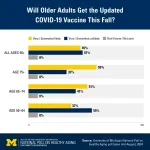(Press-News.org) When given the choice, people prefer to collaborate on work projects with higher-paid colleagues, but they want to hire subordinates with a lower pay history than theirs, according to research published by the American Psychological Association.
The research, published in the journal American Psychologist, aimed to explore how a trend toward increasing pay transparency in the business world may affect workers’ behavior.
“I've long been interested in the ways in which slight -- and not-so-slight -- differences in salaries can generate strong reactions from people,” said Kevin Kniffin, PhD, an assistant professor at Cornell University and co-author of the study. “When combined with the trend toward more pay transparency in organizations, whether required by law or crowdsourced by employees, and the trend toward more teamwork and collaboration in work, it's increasingly valuable to understand more about how people think about pay differences in relation to co-workers and potential collaborators.”
Some researchers have hypothesized that pay transparency could cause workers to resent -- and avoid working with -- higher-paid colleagues. But Kniffin and his colleague Angus Hildreth, PhD, suspected that might not be the case, and that instead people might use pay as a signal to decide which co-workers were most competent.
To explore that question, they conducted three experiments in which they gave participants hypothetical information about colleagues’ salaries and asked them whom they would prefer to work with on a project. In the first experiment, they gave 171 economics PhD students a hypothetical situation in which the students could bid to work on a project and could choose a partner to work with, knowing their potential partners’ bids as well. Nearly two-thirds (65%) requested to work with the person who asked for the higher salary.
In the second experiment, 171 online participants faced a similar scenario in which they could choose to work with a higher-paid or lower-paid colleague. At first, nearly three-quarters (73%) of participants chose to work with the higher-paid colleague. However, the researchers then gave the participants additional information that both colleagues had the same knowledge, skills, abilities and experience as the participant. After that, the percentage of participants who preferred to work with the higher-paid colleague was significantly smaller, dropping to 60%.
In a third experiment, 375 online participants were asked to name four real-life colleagues, two of whom they had worked with before and two of whom they had not. Then the participants were asked to imagine that one of each pair had a higher salary than their own, and one of each pair had a lower salary. Again, when asked to choose a project partner, the majority of participants chose the colleague with the higher salary. However, the difference was less than in the purely hypothetical experiments – in this case, when participants were choosing between two colleagues they’d worked with before, 58% chose the higher-paid colleague.
“People seem to assume that higher pay is merited and reflects greater competence. And they seem to assume that collaborating with someone with higher pay will be beneficial -- in other words, that the higher-paid coworker will share some of their greater knowledge and skills with them,” Hildreth said.
Finally, in a fourth experiment, the researchers looked at how pay history affected people’s hiring decisions. They asked 138 online participants, all with hiring experience, to choose between two job candidates with the same knowledge, skills and experience. All else being equal, 71% of participants preferred to hire a candidate with a salary history lower than their own. This may reflect a belief that salary differences should correspond to organizational rank, according to the researchers.
Overall, the research has implications for workplaces as pay transparency increases, according to Kniffin.
“While companies may anticipate pay transparency would impede employees’ willingness to work with higher-paid colleagues, we find evidence that salary disparities can actually function as a magnet for collaboration,” he said.
Future research could examine how these teaming decisions play out in the real world, according to Hildreth. “I’m intrigued by whether people actually benefit from collaborating with their higher paid peers and whether higher-paid workers do share their assumed greater skills,” he said.
ARTICLE: “Partnering Up (and Down): Examining When and Why People Prefer Collaborating with Higher-Paid Peers (and Lower-Paid Subordinates),” by Kevin M. Kniffin, PhD, and John Angus D. Hildreth, PhD, Cornell University. American Psychologist, published online Sept. 23.
CONTACT: Kniffin can be reached at kmk276@cornell.edu.
The American Psychological Association, in Washington, D.C., is the largest scientific and professional organization representing psychology in the United States. APA’s membership includes over 157,000 researchers, educators, clinicians, consultants and students. Through its divisions in 54 subfields of psychology and affiliations with 60 state, territorial and Canadian provincial associations, APA works to advance the creation, communication and application of psychological knowledge to benefit society and improve lives.
END
People prefer to work with higher-paid colleagues
High pay seen as sign of competence, study suggests
2024-09-23
ELSE PRESS RELEASES FROM THIS DATE:
Deeper corals may help shallow reefs recover in the Florida keys
2024-09-23
Since the 1970s, coral reefs in the Florida Keys National Marine Sanctuary (FKNMS) have experienced catastrophic declines in coral cover, with as much as a 50% reduction between 1998 and 2011 alone. Although coral reefs within the FKNMS have been heavily studied, research in the mesophotic zone, which extends from about 100 to 500 feet deep, has historically been more limited in this region.
Mesophotic coral ecosystems have the potential to be buffered from anthropogenic stressors due to their depth and/or relative isolation from ...
Why saying you’ll ‘never retire’ may be a warning sign
2024-09-23
COLUMBUS, Ohio – Americans who say they expect to “never retire” are more likely than others to score low on a measure of financial knowledge, a new study shows.
In a national survey, 20% of those who missed all three financial knowledge questions said they expected they would never retire, compared to 12% who answered all questions correctly, who said they’d likely work well past retirement age.
The study also found that those who were overconfident in their financial knowledge (and those whose low levels of confidence ...
Study reveals high rates of seafood mislabeling and ambiguous market names in Calgary, Alberta, highlighting species of conservation concern
2024-09-23
A new peer-reviewed study published in PeerJ Life and Environment has uncovered alarming levels of seafood mislabeling and the use of ambiguous market names in Calgary's seafood market, often concealing species of conservation concern. This research marks the first Canadian study to investigate both invertebrate and finfish mislabeling and the implications of unclear market names.
The study, titled "Mislabeled and Ambiguous Market Names in Invertebrate and Finfish Seafood Conceal Species of Conservation ...
COVID-19 hits older adults hardest; which ones want the updated vaccine?
2024-09-23
The newly updated COVID-19 vaccine just arrived in pharmacies and clinics nationwide, and a new poll suggests nearly half of people age 50 and older plan to get it. But some older adults with high risk of severe illness appear unlikely to seek the vaccine, and interest varies widely by age group, education level, race and ethnicity, and other factors, the poll shows.
In all, 45% of people age 50 and older say they’re likely to get the updated vaccine, according to the new findings from the University of Michigan’s National Poll on Healthy Aging. The data come from polling done in August 2024, just before the new vaccine was released but ...
Mental health issues are a common phenomenon in elite sport
2024-09-23
Nearly three-quarters of Dutch elite athletes and forty percent of their coaches report sport-related distress. This is one of the findings from a study conducted by Amsterdam UMC together with NOC*NSF, the organisation which represents the Dutch Olympic Committee and the Dutch Sport Federation, published today in BMJ Open Sport & Exercise Medicine.
The most common mental health problem among athletes and coaches is report sport-related distress (73% and 41%, respectively). Unfavorable alcohol consumption that can negatively affect sports performance is also common (52% and 53%). In athletes, ...
New insights into intellectual disability genetics emerge at Mount Sinai
2024-09-23
New York City (Sep 24, 2024) – Researchers at the Icahn School of Medicine at Mount Sinai have published a pivotal study in Nature Genetics (DOI: 10.1038/s41588-024-01917-1) that sheds light on a novel genetic variant associated with intellectual capacities and educational outcomes. This discovery offers new insights into intellectual disability diagnostics and potential therapeutic avenues.
The study reveals the significant impact of tandem repeats—sequences of DNA where a pattern of nucleotides is repeated multiple times in a head-to-tail manner on a chromosome—on intellectual functioning.
"The ...
Older people are more swayed by the impulsive actions of others when making financial decisions – new study reveals
2024-09-23
Older people are more likely to be influenced by the impulsive financial preferences of others than their younger counterparts, according to a new study.
Research lead by psychologists at the University of Birmingham and the University of Oxford published today in Communications Psychology, reveals that people aged 60 and over are more prone to being influenced by other people when it comes to making impulsive financial decisions compared to young adults aged between 18 -36.
The study set out to explore delayed gratification and how our willingness to wait and social influence develop and differ across our lifespan. To test how age ...
Leading scientists redefine ‘sustainability’ to save the ocean and feed a hungry and warming planet
2024-09-23
Top ocean experts have published a report that redefines the concept of “sustainable fishing” and proposes 11 “golden rules” that radically challenge the flawed approach that currently prevails in fisheries management.
Published a week before Brussels’ Ocean Week, and a few months before the UN Ocean Conference in Nice, the rules have been devised to put an end to the ongoing destruction of the oceans caused by fishing, and ensure the renewal of abundant fish populations to feed future generations.
They come at a time when scientists have drastically downgraded their assessment of the ocean’s health status.
The rules ...
Experts discover the deadly genetics of cholera, which could be key to its prevention
2024-09-23
Experts have used a cutting-edge computational approach to discover the genetic factors that make the bacteria behind cholera so dangerous - which could be key to preventing this deadly disease.
The breakthrough study, published in Nature Communications, is led by Professor Tania Dottorini from the University of Nottingham, in collaboration with Bangladesh’s Institute of Epidemiology, Disease Control and Research (IEDCR), International Centre for Diarrhoeal Disease Research, Bangladesh, and North South University.
The innovative research combines machine learning, genomics, genome-scale metabolic modelling (GSMM), and 3D ...
How remarkable diversity in heat tolerance can help protect coral reefs
2024-09-23
New research out of Southern Cross University has found previously undocumented variation in coral heat tolerance on Australia's Great Barrier Reef, giving hope that corals’ own genetic resources may hold the key for us to help in its recovery and adaptation.
In a study to be published (at 10am BST, Mon Sept 23, 2024) in Communications Earth and Environment, researchers measured the bleaching thresholds of more than 500 colonies of the table coral, Acropora hyacinthus, using a portable experimental system that was used at sea at 17 reefs spanning the Great Barrier Reef.
The study was led by Southern Cross University PhD candidate Melissa ...
LAST 30 PRESS RELEASES:
ASU researchers to lead AAAS panel on water insecurity in the United States
ASU professor Anne Stone to present at AAAS Conference in Phoenix on ancient origins of modern disease
Proposals for exploring viruses and skin as the next experimental quantum frontiers share US$30,000 science award
ASU researchers showcase scalable tech solutions for older adults living alone with cognitive decline at AAAS 2026
Scientists identify smooth regional trends in fruit fly survival strategies
Antipathy toward snakes? Your parents likely talked you into that at an early age
Sylvester Cancer Tip Sheet for Feb. 2026
Online exposure to medical misinformation concentrated among older adults
Telehealth improves access to genetic services for adult survivors of childhood cancers
Outdated mortality benchmarks risk missing early signs of famine and delay recognizing mass starvation
Newly discovered bacterium converts carbon dioxide into chemicals using electricity
Flipping and reversing mini-proteins could improve disease treatment
Scientists reveal major hidden source of atmospheric nitrogen pollution in fragile lake basin
Biochar emerges as a powerful tool for soil carbon neutrality and climate mitigation
Tiny cell messengers show big promise for safer protein and gene delivery
AMS releases statement regarding the decision to rescind EPA’s 2009 Endangerment Finding
Parents’ alcohol and drug use influences their children’s consumption, research shows
Modular assembly of chiral nitrogen-bridged rings achieved by palladium-catalyzed diastereoselective and enantioselective cascade cyclization reactions
Promoting civic engagement
AMS Science Preview: Hurricane slowdown, school snow days
Deforestation in the Amazon raises the surface temperature by 3 °C during the dry season
Model more accurately maps the impact of frost on corn crops
How did humans develop sharp vision? Lab-grown retinas show likely answer
Sour grapes? Taste, experience of sour foods depends on individual consumer
At AAAS, professor Krystal Tsosie argues the future of science must be Indigenous-led
From the lab to the living room: Decoding Parkinson’s patients movements in the real world
Research advances in porous materials, as highlighted in the 2025 Nobel Prize in Chemistry
Sally C. Morton, executive vice president of ASU Knowledge Enterprise, presents a bold and practical framework for moving research from discovery to real-world impact
Biochemical parameters in patients with diabetic nephropathy versus individuals with diabetes alone, non-diabetic nephropathy, and healthy controls
Muscular strength and mortality in women ages 63 to 99
[Press-News.org] People prefer to work with higher-paid colleaguesHigh pay seen as sign of competence, study suggests



